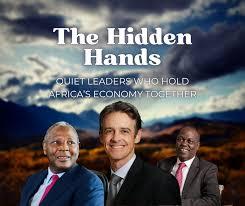Hidden Hands Leaders Africa's Economy

Africa’s economy is one of the fastest-growing in the world, yet it remains one of the least understood. While headlines often highlight presidents, ministers, or multinational investors, the real forces shaping markets are often hidden from the public eye. These “hidden hands” include powerful business magnates, financial institutions, political powerbrokers, and global stakeholders who operate behind the scenes, influencing economic decisions that affect millions of lives across the continent.
The Power Beyond Politics
Although political leaders are at the forefront of national economies, it is often the unelected power brokers who set the tone of policy implementation. These figures, ranging from business tycoons and ruling-party financiers to international lobbyists, play a decisive role in shaping economic direction. Their influence is most visible in:
-
Resource Control – In resource-rich nations such as Nigeria, Angola, and the Democratic Republic of Congo, a handful of individuals and companies control oil, minerals, and gas exports. Their decisions about pricing, export destinations, and partnerships often outweigh state policy.
-
Banking and Finance – African financial systems are heavily concentrated in the hands of a few players. For instance, in Kenya, Nigeria, and South Africa, the top-tier banks are not only financial institutions but also political influencers. They shape credit flows, investment directions, and access to capital.
-
Regional Trade Blocs – While the African Continental Free Trade Area (AfCFTA) is designed to integrate economies, many of its frameworks are influenced by private consultancies, multinational corporations, and select economic advisers whose names are rarely known to the public.
Corporate Elites as Hidden Hands
Business leaders often operate quietly but wield enormous influence. For instance:
-
Telecom Giants like MTN and Safaricom dictate the pace of digital inclusion and mobile banking, indirectly shaping tax policies and financial regulation.
-
Mining Tycoons in Southern Africa influence land policies, labor laws, and even foreign diplomacy due to their critical role in foreign exchange earnings.
-
Agribusiness Conglomerates affect food security policies by controlling seed distribution, fertilizers, and logistics networks.
These corporate leaders may not appear on electoral ballots, but their lobbying power and deep connections to state officials make them central architects of economic landscapes.
International Forces and Global Stakeholders
Africa’s economies do not exist in isolation. International lenders such as the IMF and World Bank, as well as geopolitical players like China, the EU, and the U.S., exert influence through debt negotiations, trade agreements, and infrastructure projects. These external actors often work hand-in-hand with local elites, creating alliances that determine the fate of entire sectors.
For example, Chinese infrastructure loans in Kenya and Zambia have reshaped transport and energy sectors, but the real negotiators are small circles of local ministers and private contractors who benefit directly.
The Consequences of Hidden Influence
The dominance of hidden hands in Africa’s economy has both opportunities and risks:
-
Opportunities – Strategic investments and strong private players can accelerate development, introduce technology, and create jobs.
-
Risks – Lack of transparency breeds corruption, inequality, and policies that benefit elites rather than the broader population.
Towards Accountability and Transparency
To ensure inclusive growth, African nations must strengthen governance frameworks, regulate lobbying, and demand transparency in economic decision-making. Civil society, media, and watchdog institutions play a vital role in shining light on the shadow networks that drive policies.
Conclusion
The story of Africa’s economic rise cannot be told only through presidents and parliaments. Behind the scenes, hidden hands—business elites, global financiers, and quiet political powerbrokers—continue to mold the direction of growth. Understanding their role is crucial for anyone who seeks to grasp the future of Africa’s economies.
- Vibnix Blog
- Politics
- News
- Liberia News
- Entertainment
- Technology
- Educación
- Art
- Causes
- Crafts
- Dance
- Drinks
- Film
- Fitness
- Food
- Juegos
- Gardening
- Health
- Home
- Literature
- Music
- Networking
- Other
- Party
- Religion
- Shopping
- Sports
- Theater
- Wellness



